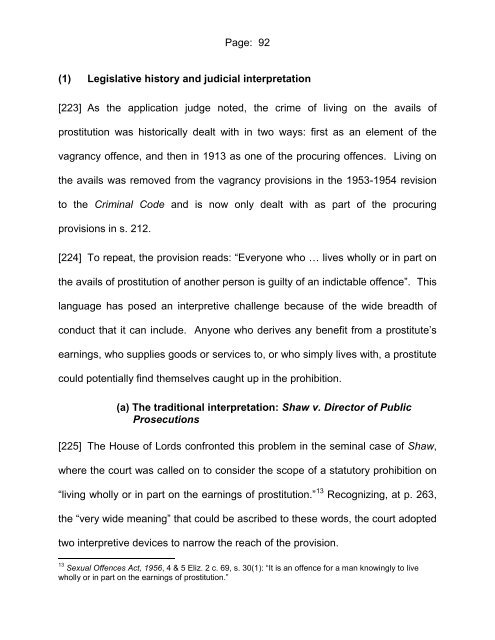Canada (Attorney General) v. Bedford, 2012 ONCA ... - York University
Canada (Attorney General) v. Bedford, 2012 ONCA ... - York University
Canada (Attorney General) v. Bedford, 2012 ONCA ... - York University
Create successful ePaper yourself
Turn your PDF publications into a flip-book with our unique Google optimized e-Paper software.
Page: 92(1) Legislative history and judicial interpretation[223] As the application judge noted, the crime of living on the avails ofprostitution was historically dealt with in two ways: first as an element of thevagrancy offence, and then in 1913 as one of the procuring offences. Living onthe avails was removed from the vagrancy provisions in the 1953-1954 revisionto the Criminal Code and is now only dealt with as part of the procuringprovisions in s. 212.[224] To repeat, the provision reads: “Everyone who … lives wholly or in part onthe avails of prostitution of another person is guilty of an indictable offence”. Thislanguage has posed an interpretive challenge because of the wide breadth ofconduct that it can include. Anyone who derives any benefit from a prostitute‟searnings, who supplies goods or services to, or who simply lives with, a prostitutecould potentially find themselves caught up in the prohibition.(a) The traditional interpretation: Shaw v. Director of PublicProsecutions[225] The House of Lords confronted this problem in the seminal case of Shaw,where the court was called on to consider the scope of a statutory prohibition on“living wholly or in part on the earnings of prostitution.” 13 Recognizing, at p. 263,the “very wide meaning” that could be ascribed to these words, the court adoptedtwo interpretive devices to narrow the reach of the provision.13 Sexual Offences Act, 1956, 4 & 5 Eliz. 2 c. 69, s. 30(1): “It is an offence for a man knowingly to livewholly or in part on the earnings of prostitution.”
















